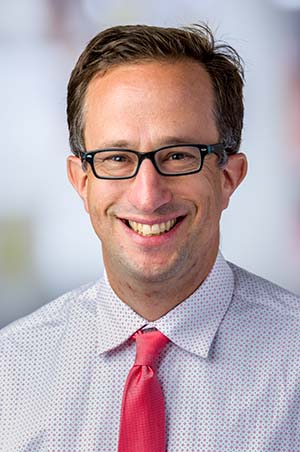Joshua T.
Schiffer
MD, MSc

(206) 667-7359
Fred Hutchinson Cancer Research Center
1100 Eastlake Ave E
Seattle, WA 98109
related links
bio
The aim of Dr. Schiffer's research program is to gain a better understanding of the quantitative features of human pathogens and immune responses. In close collaboration with colleagues at the Fred Hutchinson Cancer Research Center and the University of Washington, Dr. Schiffer designs mathematical models that capture growth and decay kinetics of infectious organisms. His models attempt to replicate detailed empirical datasets, and in turn, are used to inform subsequent human studies and laboratory experiments. At its core, his group's research tries to identify conditions that predict either containment or expansion of human pathogens.
A major focus in his group is the evaluation of interactions between herpes simplex virus-2 (HSV-2) and host immune response in the human genital tissues. HSV-2 is a globally important infection that is the leading cause of genital ulcers, and is also a critical risk factor for HIV acquisition and transmission. In addition, HSV can cause severe disease in persons with immunosuppression due to HIV, organ transplantation, stem cell transplantation, or other immunocompromised conditions. Dr. Schiffer designs detailed clinical studies to capture the dynamic features of the frequent, heterogeneous shedding episodes that are a key feature of chronic HSV-2 infection in humans, and to characterize the dynamics of the HSV-specific lymphocyte response to viral replication in the genital tract. He synthesizes this virologic and immunologic data into mathematical models of pathogenesis. While his models suggest extraordinarily rapid expansion of HSV-2 across the genital tract, each shedding episode is ultimately contained and significant immune pressure is evident within hours of shedding episode initiation. His group continues to explore the spatial immune mechanisms that lead to this balance between virus and host. As they gain a more sophisticated understanding of viral immune kinetics, his group is able to simulate clinical trials of antiviral therapy and vaccines with the goal of dose optimization.
His group is involved in a number of other projects, all of which involved the synthesis of novel clinical and laboratory datasets with mathematical models. These projects include curative approaches for chronic viral infections such as hepatitis B, HSV and HIV; role of tissue resident T-cells in containing infection in three-dimensional spatial environments; transmission dynamics of viruses in newborns; and dynamics of bacterial species that compromise the human micro biome. Please visit Dr. Schiffer's lab site for more details.
research interests
- Mathematical modeling
- HIV cure
- SARS-CoV-2 epidemiology
- Herpes complex virus-2
- Tissue-resident T cells
- Clinical trial simulation
- Viral infections in immunocompromised hosts
clinical interests
- General infectious diseases
- HIV
- Infections in immunocompromised hosts
education & training
MD, Johns Hopkins University School of Medicine, Baltimore, MD (1998-2002)
MS, Epidemiology, University of Washington, Seattle WA (2008-2009)
Resident in Internal Medicine, Johns Hopkins Hospital, Baltimore MD (2003-2005)
Senior Fellowship in Infectious Diseases, University of Washington, Seattle WA (2007-2010)
honors
Albert Schweitzer Community Service Fellowship, Johns Hopkins University (2001)
Infectious Diseases Society of Washington, Keynote Speaker, Annual Dinner (2008)
Fellow’s Travel Award, Infectious Diseases Society of America (2009)
Rising Star Program for UW Junior Faculty, Institute for Translational Health Sciences (2013)
publications
Schiffer JT, Swan DA, Roychoudhury, P, Lund, JM, Prlic, M, Zhu, J, Wald, A, and Corey, L. A Fixed Spatial Structure of CD8+ T Cells in Tissue during Chronic HSV-2 Infection. J Immunol 2018; 201(5):1522-1535.
• PubMed Abstract
Mayer BT, Srinivasan S, Fiedler TL, Marrazzo JM, Fredricks DN,Schiffer JT. Rapid and Profound Shifts in the Vaginal Microbiota Following Antibiotic Treatment for Bacterial Vaginosis. J Infect Dis. 2015 Sep 1; 212(5):793-802.
•PubMed Abstract
Matrajt L, Younan P, Kiem HP, Schiffer JT,. The majority of CD4+ T-cell depletion during acute SHIV89.6P infection occurs in uninfected cells. JVI. 2014 Mar; 88(6):3202-12.
• PubMed Abstract
Schiffer JT, Swan D, Al Sallaq R, et al. Rapid localized spread and immunologic containment define Herpes simplex virus-2 reactivation in the human genital tract. Elife. 2013; 2:e00288.
• PubMed Abstract
Schiffer JT, Swan D, Stone D, Jerome K. Predictors of hepatitis B cure using gene therapy to deliver DNA cleavage enzymes: a mathematical modeling approach. PLoS Comput Biol. 2013 Jul; 9(7):e1003131.
• PubMed Abstract
Schiffer JT, Swan D, Corey L, Wald A. Rapid viral expansion and short drug half-life explain the incomplete effectiveness of current Herpes Simplex Virus-2 directed antiviral agents. Antimicrob Agents Chemother. 2013 Dec; 57(12):5820-9.
• PubMed Abstract
Schiffer JT, Abu-Raddad L, Mark KE, Zhu J, Selke, S, Koelle, DM, Wald A and Corey L. Mucosal host immune response predicts the severity and duration of herpes simplex virus-2 genital tract shedding episodes. Proc Natl Acad Sci. 2010; 107(44):18973-8.
• PubMed Abstract



